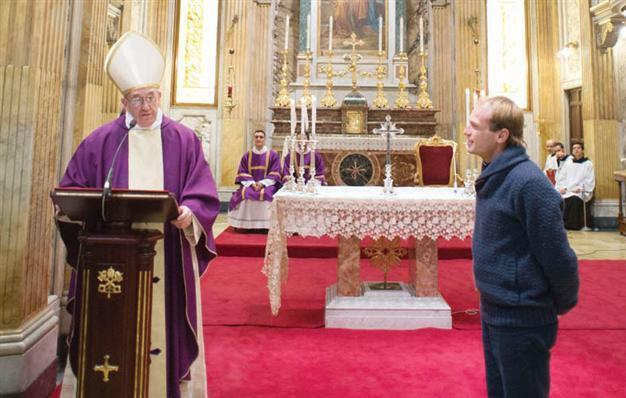Greek Orthodox patriarch stages first visit to pope's inaugural Mass in 1,000 years
ISTANBUL - Hürriyet Daily News

This handout picture released on March 17 by the Vatican press office shows Pope Francis (L) and a young priest from Uruguay during a mass at Santa Anna church at the Vatican. The installation Mass for the pope is scheduled for today. AFP photo
Fener Greek Patriarch Bartholomew, the spiritual leader of the Orthodox world, attended the installation Mass for Pope Francis in Rome on Tuesday, March 19, for the first time since the Great Schism in 1054.
Acting Patriarch Archbishop Aram Ateşyan from the Armenian Patriarchate of Turkey also presented at the Vatican, with a delegation of clergymen. Turkish Deputy Prime Minister Bekir Bozdağ was also expected to attend the ceremony.
“The alienation of old times has disappeared. As two brother churches, we are getting closer each day. We also have a theological dialogue, and the position of the pope in the Christian world is at the center of this dialogue,” Bartholomew said in a televised interview before he left Turkey yesterday.
Fener Greek Patriarchate press secretary Father Dositheos Anagnostopulos told the Hürriyet Daily News, “The first meeting [between the East and West Churches] was in 1054. Nearly 1,000 years have passed since then.”
Asked whether the meeting would contribute to the relationship between the two churches, Anagnostopulos said, “Of course, it has symbolic importance in this regard.”
According to Anagnostopulos, Ioannis Zizioulas, metropolitan of Pergamon and co-president of the Joint International Commission for Theological Dialogue between the Roman Catholic Church and the Orthodox Church; Tarassiocs, Orthodox Metropolitan of Argentina; and Gennadios, Orthodox metropolitan of Italy, accompanied the patriarch.
Dr. Lütfü Özşahin, a historian specializing in the history of religions, said the meeting was crucial in many aspects. Özşahin recalled that the Second Vatican Council, which was organized as a first attempt to create dialogue between the two churches, took place in 1965.
“[The meeting] also has a political dimension. Keep in mind that even though it is not officially mentioned, the EU is a holy alliance of Christians, while the Fener Greek patriarch is the spiritual leader of the Orthodox world. Whether Turkey accepts it or not, the Fener Greek Patriarchate is ecumenical, thus it has a primary importance for Orthodoxies,” Özşahin said. Turkey does not currently recognize the ecumenical status of the Fener Greek Patriarchate.
“Greeks, Serbians, Georgians and Armenians have independent churches, which means the Fener Greek patriarch cannot represent the whole Orthodox world in every aspect,” Özşahin said, adding that the Russian Orthodox Church, which has had conflicts with the Fener Greek Patriarchate for centuries, is a good illustration of this.
“This meeting also demonstrates the importance the pope gives to the Islamic world. After resolving the issues between Christians, the new pope might take action to engage in dialogue with the Islamic world,” Özşahin said.
Ateşyan said he welcomed the move. “The meeting is important in terms of resolving the problems between churches and sects, and improving relations between the Eastern and Western Churches.”
Professor İlber Ortaylı, a historian, on the other hand, felt it was misguided to read such far-reaching significance into the meeting. “They are going to congratulate [Pope Francis’ installation]; it shouldn’t be exaggerated.”
Meanwhile Turkey’s ambassador to the Vatican, Kenan Gürsoy, said they had observed a high degree of respect toward Bartholomew.
When asked for his views on the meeting, Gürsoy said it would be more appropriate to leave the comments to historians and experts on the subject.
